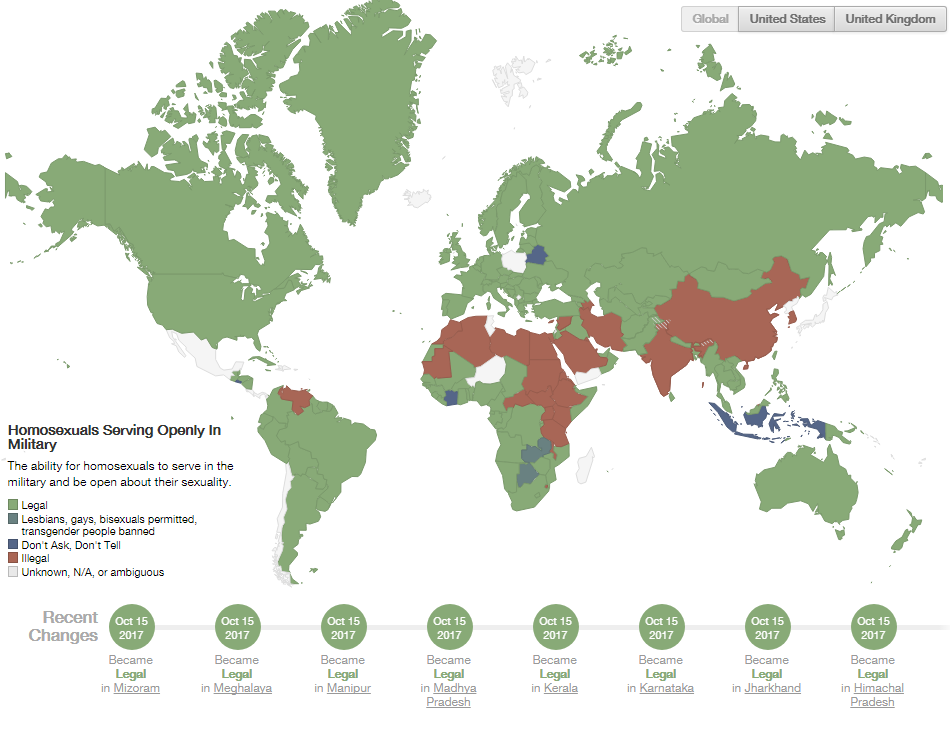What you need to know about LGBT rights in 11 maps
These maps chart LGBT rights progress around the world.
Image: REUTERS/Darren Ornitz
Stay up to date:
Gender Inequality
Australians have voted in favour of legalising same-sex marriage. The non-binding postal vote saw 61.6% of people support allowing same-sex couples the right to marry.
The Australian Prime Minister, Malcolm Turnbull, said his government would aim to get legislation passed by Christmas.
Some 12.7 million people - nearly 80% of eligible voters - took part in the poll.
LGBT rights: a long way to go
According to Equaldex, there are 73 countries where homosexual activity is illegal.
And only five countries in the world – Bolivia, Ecuador, Fiji, Malta and the UK – have constitutions that explicitly guarantee equality for citizens on the basis of sexual orientation as well as gender identity, according to a recent UCLA study.
Meanwhile, the changing political climate under the Donald Trump administration has prompted concern among gay and transgender groups about what might happen to LGBT rights in the US.
These 11 maps, collated by Equaldex, show the state of LGBT rights across the world.
Where is homosexuality still illegal?
The latest Equaldex research shows that consensual sexual activity between individuals of the same sex is legal across much of the northern hemisphere. But across swathes of Asia, Africa and the Middle East it remains illegal.
In some countries, it is punishable by death – in Mauritania, Saudi Arabia, Iran and Afghanistan.
In other countries, it’s illegal only for men. For example, in Turkmenistan, Sierra Leone and Zimbabwe homosexuality is illegal for men but legal for women. In no country is it the other way round.
Where can same sex couples get married?
Despite many countries legally recognizing LGBT rights, some of them still outlaw same-sex marriage. This map shows the clear East/West divide between where you can marry a same-sex partner and where you can’t. Colombia legalized same sex marriage in the last year, but it became illegal in Botswana.
Germany legalised same-sex marriage earlier this year, as did Malta, Bermuda and Finland.
Changing gender
The right to change gender is legal throughout most of the world, but in most places only after surgery. It is still illegal in around 20 countries.
LGBT rights for adoption
Across much of the world, same-sex couples cannot legally adopt a child. In those countries where same-sex adoption is legal, many stipulate that couples must be married, or can only do it if they are single. In some cases, they can only adopt stepchildren.
LGBT rights against discrimination
Banning discrimination on the basis of a person’s sexual orientation and/or gender identity is illegal in only a handful of countries.
Much of the world offers no protection at all.

Employment discrimination
There are only a few parts of the world where employers are not allowed to discriminate on the basis of sexual orientation and/or gender identity.

LGBT rights for housing discrimination
Although source information is patchy, it’s clear that the LGBT community continues to face discrimination when trying to find appropriate housing.

Military
A surprising number of countries don’t discriminate against LGBT people joining the military.
US President Donald Trump announced in the summer a ban on transgender personal serving in the military, but at the end of October 2017 a judge blocked the ban.

Blood donations
Several countries made blood donations by gay men legal in the last year, but many are still subject to deferrals (a waiting time before a man can donate after having sex).
According to Equaldex, blood donation by gay men became legal in countries including Romania, Georgia, Venezuela, Ethiopia and Ireland.
But it was banned in Norway, and a one-year deferral period was introduced in Switzerland.

Age of consent
Last year, the age for consent for heterosexuals and homosexuals was made equal in Australia and Belize. In the US the law remains unclear in several states.

LGBT rights for conversion therapy
Many places in the world continue to allow conversion therapy, which attempts to change a person’s sexual orientation.

Equaldex is a collaborative LGBT rights website launched in 2014. The crowdsourced project works a lot like a ‘LGBT Wikipedia’ – anyone can join, edit and amend information. Other users are encouraged to authenticate the accuracy of each update and the information becomes verified as site usage increases.
Don't miss any update on this topic
Create a free account and access your personalized content collection with our latest publications and analyses.
License and Republishing
World Economic Forum articles may be republished in accordance with the Creative Commons Attribution-NonCommercial-NoDerivatives 4.0 International Public License, and in accordance with our Terms of Use.
The views expressed in this article are those of the author alone and not the World Economic Forum.
Related topics:
Forum Stories newsletter
Bringing you weekly curated insights and analysis on the global issues that matter.
More on Civil SocietySee all
Daniel Dobrygowski and Giannis Moschos
May 21, 2025
Gustavo Maia
April 22, 2025
Michael Boampong and Kajsa Hallberg Adu
April 16, 2025
Toshihiro (Toshi) Nakamura and Ewa Wojkowska
April 11, 2025
Sophia Otoo and Cynthia Rayner
April 2, 2025
David Sangokoya and Jack Hildebrand
March 3, 2025





